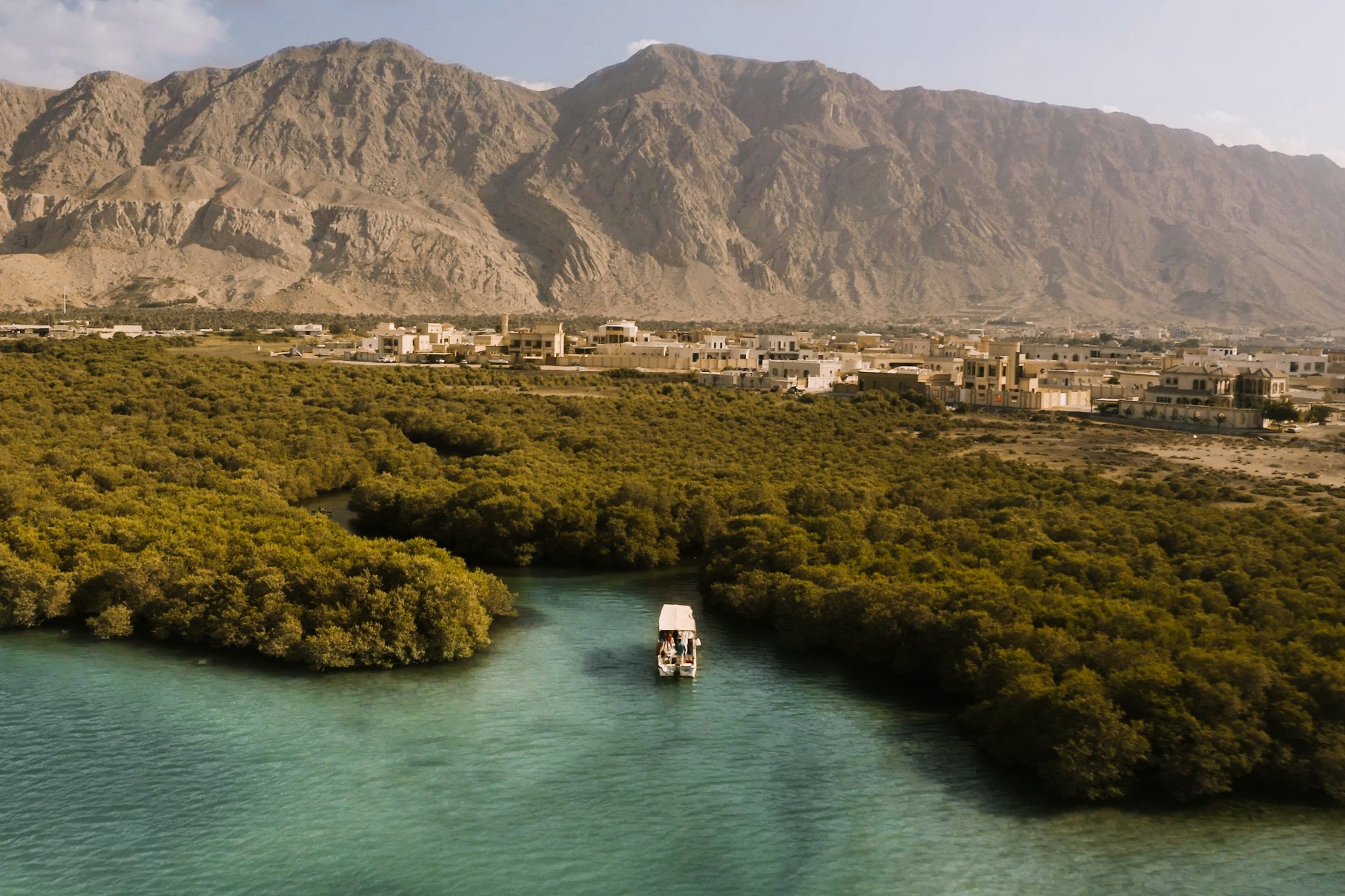Skift Take
The UAE’s “Nature Emirate” is on a quest to become a regional leader in sustainable tourism by 2025. Its “Balanced Tourism” approach offers vibrant nature and cultural adventures alongside support and incentives for both new and existing hotels.
This sponsored content was created in collaboration with a Skift partner.
As travel returns, destinations and tourism boards pivoting toward sustainability — and those with the most ambitious, authentic, and achievable sustainability goals — will reshape how we travel in the decade ahead. According to Expedia Group Media Solutions’ 2022 Sustainable Travel Study, half of consumers want to see more information on sustainability from destinations.
On a mission to engage this more responsible traveler, Ras Al Khaimah has declared its vision to become the Middle East’s most sustainable destination by 2025, with the goal of attracting over 3 million visitors annually by 2030. Its new “Balanced Tourism” strategy, created in partnership with EarthCheck, the world’s leading scientific benchmarking, certification, and advisory group for travel and tourism, goes far beyond tackling single-use plastic and promoting recycling to scale up sustainability in every sense.
The process began with a policy commitment from Ras Al Khaimah Tourism Development Authority and its partners across government and industry, before establishing the benchmarks that progress would be measured against. The second part of the sustainability strategy takes the form of two certification programs, one for the destination and one for businesses, the latter looking to drive sustainability certification for at least 30 tourism businesses initially.
To tackle hot-button issues like overtourism, Balanced Tourism encompasses areas including cultural preservation and social and economic sustainability. As Raki Phillips, CEO of Ras Al Khaimah Tourism Development Authority, said: “Usually everybody only talks about the environmental piece and forgets about the social and the economic piece. We wanted to make sure we were supporting smaller businesses and that whatever efforts we make also keep the local ecosystem, population, culture, and heritage in mind.”
Inspired by the blueprint set by countries like Slovenia, Costa Rica, and Rwanda, Ras Al Khaimah seeks not only to build the foundations for sustainable tourism growth at home but to establish a template for other destinations that wish to make a meaningful impact on sustainability without “greenwashing” or sacrificing tourism goals.
Sustainable Development
Tourism is a central part of Ras Al Khaimah’s economy, contributing over 5 percent of its GDP and providing around 10,000 jobs. However, this growth can also threaten the country’s natural splendor, giving rise to issues like overtourism, population growth, and environmental damage.
One way in which the tourism authority plans to combat this is by taking a measured approach to hotel development. Any property will have to abide by newly introduced green building codes that prioritize sustainable standards in areas such as food waste reduction and sustainable landscaping.
“This green hotel rating is an initiative that aims to achieve 100 percent integrated sustainability in all of Ras Al Khaimah’s hotels,” said Phillips. “We’ve also launched our green public procurement program (GPP) to support the adoption of sustainable procurement practices and produce products and services that have a low environmental impact.”
Take the recently integrated Wynn Resort, set to open in 2026. The brand is known for its pioneering approach to sustainability and energy efficiency, with a target of achieving 50 percent renewable energy by 2030. It has already implemented robust waste management programs at its properties, diverting between 26 percent and 100 percent of waste from entering landfills, as well as reducing water consumption and investing in new waste-to-energy solutions.
Sustainable development is also a question of market positioning, whether to developers, existing hotels, travelers, or the wider world. “We’re open for tourists, and we love welcoming them, but the way we message and position ourselves as a sustainable destination sets a certain expectation,” said Phillips.
Hosting upcoming events like the Conference of Parties (COP) to the United Nations Framework Convention on Climate Change in 2023 will also help set this expectation. Working with hotels to develop value propositions that cater to eco-conscious clients is another. “We want to make sure we are able to drive the maximum amount of profitability for hospitality partners,” said Phillips. “We are talking about a 50 percent five-star inventory.”
This means meeting with local community partners to help them understand how to drive a higher average rate rather than focusing on volume business, as well as setting KPIs and incentivizing with benefits such as tax offsetting. “We rebated 20 percent of the destination fee during Covid to help keep hotels afloat. Now we’ve added that element into sustainability, where based on specific metrics being met, we’re rewarding hotels and businesses,” said Phillips.
Attractions With Purpose
Unlike other tourist destinations in the UAE, Ras Al Khaimah has the advantage of being a developing destination — or what Phillips calls “a destination of the future.” This presents an opportunity to do things differently. And by investing around $140 million into 20 projects that will be built according to these new sustainability standards, Ras Al Khaimah is actively walking the walk when it comes to securing a more sustainable future.
Rather than massive attractions designed to drive mass volumes, the projects chosen have a strong sustainable focus, ranging from 50 kilometers of hiking trails to a tobogganing ride called the Jais Sledder. In the mountains, guests will be able to check into Anavrin Equestrian Resort, a wellness resort focused on “healing with horses” set to open in Q4 2022, and Saij Mountain Lodge, a protected and sustainably managed resort featuring lodges made from natural and sustainable materials, opening on Jebel Jais in 2023. At sea level, the proposed Scallop Ranch at Al Hamra Marina will enhance understanding of the marine ecosystem.
Cultural Conservation
Ras Al Khaimah is home to four cultural and heritage sites that are on the UNESCO World Heritage Tentative List, the most among the Emirates. Preserving and restoring these cultural treasures is therefore a crucial part of its sustainability strategy, providing storied alternatives to crowded heritage sites for curious travelers.
Examples already underway include Suwaidi Pearls Farm, the only site in the UAE which still cultivates local pearls by hand, and Al Jazirah Al Hamra, an ancient pearling village of the Al Zaab tribe. Working with UNESCO experts and the Ministry of Culture and Tourism, a program is underway to restore the village using traditional, sustainable materials by 2025, as well as creating curated tours that underpin its unique tribal history.
Community and Liveability
In addition to these cultural restoration projects, the tourism authority is engaging with the local community by staging over 20 events a year, including the RAK Fine Arts Festival, RAK Half Marathon, DP World Tour, and UAE Tour. Its sustainability strategy also involves programs to help the community think more sustainably — for example, it created a Buy RAK program for local suppliers that have a very low carbon footprint, negotiating deals for local fishermen to be able to buy directly. This will be supported by a carbon-mindful event in December to further educate the community.
The tourism authority also acknowledges the importance of employee well-being, having launched RAKFAM, a series of initiatives aimed at enriching connectivity, community life, and facilities for tourism sector employees in the Emirate. With several progressive policies in place to promote employee well-being, the tourism authority was recognized as the sixth-best workplace in the UAE by Great Place to Work for 2022 in the “small and medium organizations” category.
Ultimately, Ras Al Khaimah is pioneering this holistic approach to destination management not just because it’s the right thing to do. “Our customers are demanding it,” Phillips said. “We know travelers are looking for destinations where sustainability is at the forefront.”
For more information about Ras Al Khaimah Tourism Development Authority, click here.
This content was created collaboratively by Ras Al Khaimah Tourism Development Authority and Skift’s branded content studio, SkiftX.
Have a confidential tip for Skift? Get in touch

